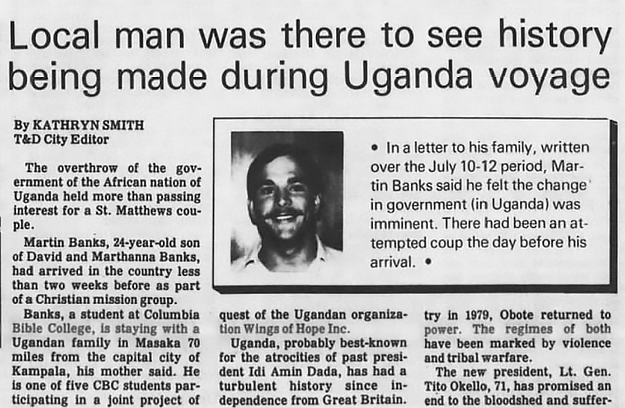Date: August 1, 1985
Location: Orangeburg, South Carolina
By: Kathryn Smith
Newspaper: The Times and Democrat
Page: 1B, 2B
The overthrow of the government of the African nation of Uganda held more than passing interest for a St. Matthews couple.
Martin Banks, 24-year old son of David and Marthanna Banks, had arrived in the country less than two weeks before as part of a Christian mission group.
Banks, a student at Columbia Bible College, is staying with a Ugandan family in Masaka 70 miles from the capital city of Kampala, his mother said. He is one of five CBC students participating in a joint project of Pioneers Missions and Ambassadors for Christ, and came for a month-long stay at the request of the Ugandan organization Wings of Hope Inc.
Uganda, probably best-known for the atrocities of past president Idi Amin Dada, has had a turbulent history since independence from Great Britain. Amin had taken over the government from Milton Obote in 1971 and when he fled the country in 1979, Obote returned to power. The regimes of both have been marked by violence and tribal warfare.
The new president, Lt. Gen. Tito Okello, 71, has promised an end to the bloodshed and suffering in his country and free elections within 12 months.
The Bankses have received one letter from their son, written over the July 10-12 period. Obote was ousted July 27. In his letter, Martin said he felt the change in government was imminent, Mrs. banks said.
There had been an attempted coup the day before his arrival, and Banks’ letter said “Somethng is up know, too,” noting his group was stopped six or seven times at roadblocks on the way to the airport to pick up a team member.
Bank was staying in a village of about 20,000 people when he first arrived, but had visited Kampala and was scheduled to spend more time there at the end of this week. He described the Kampala skyline as looking much like that of Columbia but said the roads were very bad.
The excesses of the past and present administrations are evident, his letter said, in the many maimed and handicapped people he saw.
Banks was finding the Ugandans very friendly and curious. He is a bit of an oddity in that country, for he said he did not see another white person until his second full day there. The country still shows evidence of its colonial period under England, he wrote. Ugandans have tea at four and speak English with a British accent.
There were American influences, too. A Michael Jackson song was playing on the radio of a taxicab he took one day in Kampala.
Bank’s letter took 11 days to arrive in the United States and Mrs. Banks said she has not gotten another since then. However, she has notified U.S. Rep. Floyd Spence’s office that he has a constituent in the country. Spence’s office told Mrs. Banks the U.S. State Department is keeping records of which Americans are in the country, as the borders have been closed.
A convoy of about 40 cars carrying 300 foreigners, many of them American Embassy personnel or families, made its way to Kenya Wednesday. Escapees reported power outages, widespread looting and food shortages in Kampala.
Mrs. Banks said Spence’s office told her Wednesday that the situation continues to improve and Martin should have no problem leaving Aug. 12. His next destination before returning home in September is an island off the coast of China.
